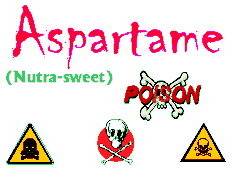
There is plenty of information on the internet regarding both the safety and the dangers of these non-nutritive chemicals. There is also a lot of politics regarding artificial sweeteners and how they were passed as safe through the FDA (Food and Drug Administration).
So are they really that bad for us?
Well first of all I would like to talk about the most well known sweetener ‘aspartame’ code 951 a.k.a NutraSweet or Equal. It is about 200 times sweeter than sucrose (table sugar) and said by health and medical practitioners to be a proven carcinogen. Not according to the FDA though, they pass it off as safe – but at what limit? Read on.
So what is Aspartame and what do our bodies do with it?
Well we break it down to 40% aspartate, 50% phenylalanine (an amino acid that can harm you if your allergic to it) and 10% methanol with is wood alcohol (a deadly poison).
Now apparently this is all fine in small amounts, but what happens when a person drinks a litre of diet soft drink, snacks on a diet yoghurt, chews a few pieces of gum and makes a stir-fry with some diet sweet chilli sauce, could we be exceeding these so called limits. Who is even aware of what the limits are?
Some of the side affects you are most likely to encounter from an artificial sweetener are;
- An upset stomach or diarrhoea
- Increased hunger and cravings
- Lowered serotonin – causing mood swings or depression
- An increase in insulin production – this can cause our fat cells to absorb more fat than normal especially around our mid section.
- It can also impair sleep in some people
These toxic chemicals can have an even greater impact on our children. Their nervous system and blood brain barrier is still weak and susceptible to allowing these substances through, which may change the chemical makeup of the brain.
This can lead to illnesses such as ADD, ADHD, Autism and other neurological problems. For these reasons its best you stay away from any artificial sweeteners in pregnancy and nursing.
- Other types of artificial sweeteners include:
- Sucralose: (Code 955) a.k.a Splenda. It can be found in more than 4500 food and beverage products. This non-caloric sweetener is 600 times sweeter than sucrose (table sugar). Some adverse effects can be seen when the estimated daily intake which is 1.1mg per kilo of body weight per day is exceeded. Luckily this variation of sugar is not largely absorbed by the body, we only retain around 11-27% and the rest is excreted through the urine and feces.
- We also have Saccharin: (Code 954) a.k.a Sweet’N Low. 300 times sweeter than sugar. I won’t go into the chemistry of this – but will tell you it originated as a derivative of coal tar. In the early 1970’s it was put on the ‘substances known to induce cancer in man or animals list’ due to the fact that a protein (more prevalent in male rats), when combined with saccharin, caused the rat to produce high levels of microcrystals which damaged the lining of the bladder and caused the lab rats to grow huge tumors in their bladders. 30 years later in the year 2000 it was taken off the list because scientists learnt than rodents had a different biochemical structure to humans..or was there another reason? I’d definitely advise to away from this one!
- Another widely used sweetener is Acesulfame Potassium or Ace K (Code 950) 200 times sweeter than sugar. It’s often blended with other sweeteners due to its bitter aftertaste. Relatively new on the scene it was discovered in1967. It is a concoction of chemicals too hard to pronounce (or spell). It may be carcinogenic if you consume over the estimated daily limit and interestingly in one mouse study it was shown to affect prenatal development as its ingested through the amniotic fluid and breast milk. This in turn is suspected to alter the babies sweet preference’s into adulthood.
Where are they found?
You will find artificial sweetener’s lurking in soft drinks, sauces, ice-cream, yoghurt, chewing gum, tooth paste, pharmaceuticals including children’s pain & fever relief and cough medicines, protein shakes and supplementary sports foods.
You won’t find any artificial sweeteners in the Healthy Mummy Smoothies, as their main concern is of the health of mum and baby. There is only a small amount of natural sugar combined with natural flavours so they taste much better (and are much better for you) than any artificially sweetened shake or beverage.
If you like a little sugar in your morning tea or coffee, try using a little natural sweetener such as honey or stevia.
Written by Elisha Danine, Nutritionist
And don’t forget to check out our current promotions and discounts page to see what specials we have on this week on our Healthy Mummy product range
